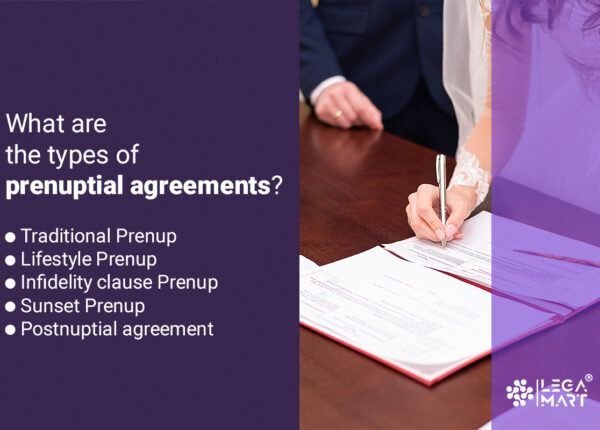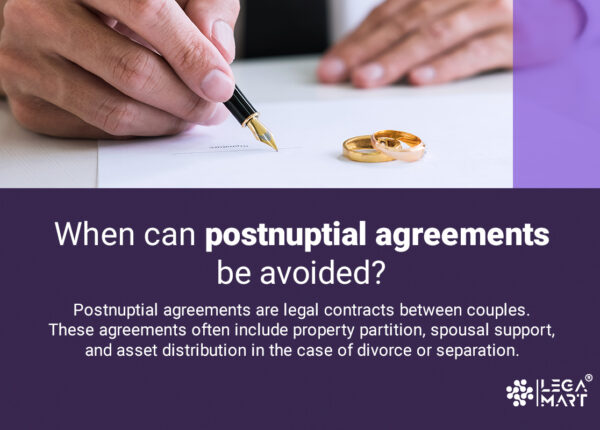Introduction
You must have heard about various celebrities entering into prenuptial agreements with their spouses to be able to protect their respective interests. Some common examples that you might have come across are the prenuptial agreement between Beyonce and Jay Z, wherein Beyonce was supposed to receive $5 million for every child that the couple had and $1 million for every year of marriage. Another example was the case of Kim Kardashian and Kanye West, according to which, in the event of divorce, Kim could keep her wedding ring, gifts received, and her income. Another case is of Jessica Biel and Justin Timberlake, who have a prenuptial agreement about cheating, wherein if Justin cheats on Jessica, she will receive $500,000.
Enforcing a prenuptial agreement can help you in saving a lot of money if the marriage ends. Also known as a “prenup”, the document mainly details all your assets, debts, and distribution in case the marriage ends. While no one wants to think about the relationship failing even before it has commenced, however, the main aim of the prenup is to prepare oneself for the worst-case scenario of marriage, i.e., divorce.
What Is Supervised Visitation And How Does It Works For Families? – Legamart
This article analyzes prenup agreements and their working in the USA, the UK, and Canadian jurisdictions. Let’s start!
What is the importance of prenuptial agreements?
A prenuptial agreement is a private contract which is used to establish and detail the property, financial rights, and other similar matters for each spouse. This agreement is usually used by high-net-worth individuals who cap the amount of money their ex-spouse can claim. Like estate planning, the agreement helps determine who will get what in the event of a divorce. This helps the parties to objectively clarify the potential conflicts that may arise at the later stage of the marriage.
Prenuptial agreements are also used to decide whether alimony would be expected if the marriage ends, along with the amount and terms of the alimony payments.
While the agreement aims to protect both individuals and help them obtain a quicker resolution for their divorce, if one spouse contests the validity of the prenup itself, it can open a long-drawn litigation proceeding. Therefore, consider all possibilities before going ahead with the execution of a prenuptial agreement.
What are the important elements of prenuptial agreements?
The following are some important factors of prenuptial agreements that must be considered before executing them:
The Basics
It is important to note that every state has rules for enforcing and validating prenups. Usually, factors like where the wedding took place and the permanent residence of the couple determine the applicable laws. Couples mostly look for states that are most helpful in forwarding their requirements from the prenup agreement. Some common aspects required to be included within the agreement are the fairness of the contract, parties expected to disclose their belongings fully, and parties retaining their respective personal lawyers.
Fairness
Fairness is a contentious topic within prenuptial agreements. This is because the enforceability of the agreement might be affected if the prenuptial agreement is unfair to one spouse. Therefore, ensure that the negotiations are undertaken fairly while taking into account the circumstances specific to yourself.
Importance of Disclosures
Parties are expected to disclose their assets within the prenuptial agreement completely. Some states also consider the prospective inheritance of each party, wherein any anticipated inheritance that the spouses might be getting in the future is also expected to be disclosed within the agreement.
Do not include children
It is important to note that a prenup contract cannot be used to offer or restrict any child rights or child support. Therefore, avoid negotiating your future kid’s rights within a prenuptial agreement.
What are the types of prenuptial agreements?

Different types of prenuptial agreements may exist depending on the requirements and concerns of the couple involved. Some common types are:
Traditional Prenup
This is the most common form of prenup used by couples. It addresses various topics, including inheritance rights, spousal maintenance, and property partition. Therefore, this type of agreement helps address most of the common issues that can arise between a couple, and hence, is also considered the most appropriate form of prenuptial agreement.
Lifestyle Prenup
This type of agreement sets realistic expectations and restrictions for a couple. This agreement mainly addresses lifestyle-related issues, such as dividing domestic duties, professional aspirations, frequency of holidays, etc. Therefore, within this agreement, the couples can divide their domestic chores, which helps ensure that each spouse equally partakes in household responsibilities and neither party is overburdened with responsibilities.
Infidelity clause Prenup
If you want to set up boundaries and objectives related to fidelity in your marriage, this is the right agreement for you. The agreement is mainly used to incorporate the consequences of adultery, such as any decrease in alimony or support that the faithful spouse may provide to the cheating spouse.
It is also possible for couples to specify what amounts to adultery, including aspects of physical infidelity, emotional affairs, or online interactions. The agreement is useful to prevent potential misunderstandings and disputes during the marriage.
Sunset Prenup
This agreement outlines each spouse’s financial rights and duties, restricted to a certain period. This is especially useful for couples who want clear limitations on their financial prospects but, at the same time, they do not wish to be bound by a permanent prenup. Therefore, couples can choose an expiry or termination date for the agreement, such as after 5 years of marriage. This agreement especially helps couples get more freedom and control over their finances.
Postnuptial agreement
While it is similar to a prenuptial agreement, the only difference is that this agreement is executed after the couple has married. This agreement is mainly used to address financial changes that may have occurred since the wedding. It is most commonly used when significant changes in the previously involved assets exist.
What are the challenges associated with prenuptial agreements?
The main challenges to a prenuptial agreement are mainly faced at the enforcement stage, wherein certain provisions might be seen as unfair or more biased toward one spouse. In such cases, it becomes imperative to seek the services of an experienced lawyer to help you mitigate the challenge. Some common challenges faced are:
- Conflict with state laws. Often, this is one of the most difficult problems the couple faces during enforcement and may affect financial dissemination, custody issues, etc. This is because many states tend to have specific laws for divorce, death, and inheritance; hence, all these rules must be considered before drafting a prenuptial agreement.
- Disclosure of Debt and Assets. If the parties have not been honest and have not disclosed the details of all their assets and debts, it is capable of causing serious problems during the enforcement stage. If any hidden assets are found with any of the parties, it can invalidate the entire agreement or a part of the agreement, depending upon the facts and circumstances of each case.
- Willingness to enter into a prenuptial agreement. There are instances where either party is unwilling to enter into a prenuptial agreement but ends up signing the agreement due to pressure from family or the spouse. However, coercion, intimidation, or manipulation of any kind during the incorporation of the agreement can invalidate the agreement completely.
- Invalid Provisions. Some terms incorporated within the prenuptial agreement might be invalid due to contradicting laws, state/federal law violations, or unfairness. For instance, if you have included the aspects of custody of minors, it cannot be enforced in a court of law.
- Moral Clause. There are some states which have moral clauses for divorce and dissolution of marriage. While not all prenuptial agreements may be inclusive of a moral clause, however, if the spouse possessing more funds has cheated during marriage, the court can invalidate the prenup based on moral grounds, depending upon the prenuptial laws that the state follows.
How do you bring up the subject of a prenuptial agreement?

You cannot wait for a perfect time to bring up the subject since there never is a perfect time to have this conversation. However, if you decide to have this uncomfortable conversation with your future spouse before marriage itself, it is capable of saving a significant amount of emotional stress and financial stress during the bad marriage days when the eventual decision is to divorce. Rather than bringing up a prenuptial agreement a few days before the wedding, discussing it while you are still engaged is better. This is an essential discussion for couples with significant individual assets or debts, dependents, or small businesses.
Some common ways to navigate the primary discussion related to prenuptial agreements are:
- Weaving the conversation around a broader topic related to marriage.
- Don’t demand a prenuptial agreement, but open the topic for discussion.
- Ensure that the conversation does not take place just days before marriage but during the initial period itself.
- Emphasize the idea of fairness for both parties.
What does a prenuptial agreement cover?
If a prenuptial agreement has been properly negotiated, it covers the following interests and assets:
- Retirement or education funds that both parties have individually accumulated before marriage.
- Property owned by either party at the time of marriage.
- Property interests of any children from previous relationships.
- Obligations of spousal support if the marriage dissolves.
- Educational and religious upbringing of children born from marriage.
- Finances of each party and their responsibilities.
- Provision stating that one spouse is not obligated to pay the debts of the other spouse.
- Inheritance handling.
- Ownership rights in life insurance or disability policies.
Please keep in mind that it is not always necessary that the agreement shall be deemed enforceable if these provisions are incorporated within the agreement. If a judge believes that the agreement is unfair or conflicts with the legal standards, then even these provisions can be unenforceable. Additionally, rules can vary from state to state regarding certain provisions; hence, they need to be kept in mind.
What does a prenuptial agreement not cover?
The following provisions are unenforceable if they have been incorporated within your prenuptial agreement:
- Child custody or visitation matters.
- Alimony, in case of divorce.
- Anything else prohibited by the law.
How does a prenuptial agreement work in the USA, the UK and Canada?

Prenuptial agreements in the USA
In the US, there is a surge in the popularity of premarital agreements, also known as prenuptial agreements. The Uniform Premarital Agreement Act (UPAA) was drafted to establish greater consistency and predictability in state laws concerning these contracts, given the growing mobility of society. The UPAA sought to ensure that a prenup, validly executed in one state, would be recognized and enforced by courts in another state where a couple might seek a divorce. Presently, 28 states and the District of Columbia have adopted either the UPAA or the updated Uniform Premarital and Marital Agreements Act (UPMAA) introduced by the Uniform Law Commission in 2012. These Acts generally provide clear requirements to make marital agreements enforceable and legally binding. While there are variations across states, the introduction of the UPAA significantly facilitated the preparation of legally compliant prenups for practitioners.
Statistics
Prenuptial agreements, despite their potential benefits, are utilized in approximately 10% of marriages in the US. Nearly 50% of unmarried individuals perceive prenuptial agreements as helpful. In comparison, 63% of individuals would feel intimidated or believe that their risk of divorce is higher if their partner proposed a prenup. Approximately 15% of recently divorced individuals regret not drafting a prenuptial agreement, while over 50% of divorce lawyers have observed an increased demand for prenups.
Validity and Requirements
For a prenuptial agreement to be enforceable in the US, it must have appropriate provisions that comply with state and federal laws. The agreement can be enforced by the spouses or the surviving spouse in court if necessary. Key considerations include:
- Adherence to the state laws: The agreement must adhere to state laws and not violate them.
- Disclosure of Assets and Debts: Both parties must provide complete disclosure of their financial holdings, including assets, debts, and other relevant information.
- Provisions in the Prenup: The provisions in the prenuptial agreement must comply with applicable laws, regulations and be fair and reasonable.
- Fairness of Terms: The terms within the prenuptial agreement should be fair for both parties, considering their circumstances. Fairness is subjective but should strive to balance the interests of both spouses.
- Willingness to Enter into the Agreement: Both parties should enter the prenuptial agreement voluntarily, with independent lawyers who explain the legal aspects and implications.
- Enforcing the Document: If a dispute arises and the marriage becomes irreparable, the prenuptial agreement may need to be enforced through court proceedings. The judge will assess the validity and requirements of the agreement, and if upheld, the provisions will be implemented as specified.
Prenuptial agreements in the UK
Prenuptial agreements are becoming increasingly popular among couples in the UK. While no one enters a marriage intending to divorce, the reality of more divorces in the UK has led more pragmatic spouses to consider prenuptial agreements. By opting for a prenup, couples aim to mitigate the potential for a contentious or prolonged divorce in the unfortunate event of a separation.
Statistics
Nevertheless, prenuptial agreement statistics in the UK have gradually increased in recent years. According to a report from the think-tank Marriage Foundation in 2021, approximately one in five couples who have married since 2000 had a prenuptial agreement. This indicates a notable rise compared to the 8 per cent observed in the 1990s.
Validity
A commonly asked question pertains to the enforceability of prenuptial agreements in the UK. Prenuptial agreements in the UK are not legally binding, but the Courts have recognized them as influential and, in certain cases, even decisive.
It is, therefore, crucial to understand that although prenuptial agreements are legally recognized documents that hold weight when properly drafted, the court has the discretion to distribute a couple’s assets differently than what is stated in the prenup, depending on the specific circumstances of the case. To ensure the validity of your prenuptial agreement, it is essential to ensure the following conditions are fulfilled:
- Full disclosure: Each party must provide comprehensive disclosure of their assets, liabilities, and debts within the agreement.
- Voluntary agreement: The agreement must be entered into willingly and without any form of coercion or duress.
- Retirement waivers: Prenuptial agreements cannot include waivers of retirement benefits.
- Time frame for review: The agreement must be reviewed and finalized within the required time frame as stipulated by relevant laws and regulations.
Requirements
Under UK law, a prenuptial agreement is not automatically considered legally binding. However, it can be upheld by a court if it satisfies specific qualifying requirements, as determined by the Supreme Court and further reviewed by the Law Commission in its report titled “Matrimonial Property, Needs, and Agreements”, outlining recommendations for the enforceability of prenuptial agreements. These requirements include;
- The agreement must be legally valid, ensuring it can withstand challenges based on factors like undue influence or misrepresentation, i.e. it should be entered willingly and without coercion by both parties.
- The agreement must not be made within 28 days immediately before the marriage or civil partnership takes place.
- Both parties must receive full disclosure of relevant financial information about each other’s financial circumstances at the time of making the agreement.
- The agreement must be executed as a deed and include a statement signed by both parties, acknowledging their understanding of its enforceability and its effect on limiting the court’s discretion in making financial orders.
- Both parties must obtain legal advice when the agreement is formed.
- The terms of the agreement must not undermine the reasonable needs of any children involved.
Prenuptial agreements in Canada
Prenuptial agreements are experiencing an increasing trend of popularity in Canada. Furthermore, Canadian courts consistently enforce these agreements. Before 1978, prenuptial agreements in Canada were not upheld by courts. However, the enactment of the 1978 Family Law Reform Act specifically authorized the use of marriage contracts, which have been recognized and enforceable in the country ever since.
Statistics
According to data, the percentage of the total population in Canada opting for prenuptial agreements is estimated to be around 10-15%. It is important to note that these agreements involve private relationships, making it challenging to gather comprehensive statistical information on most relationships. However, considering the high divorce rate in recent years, which stands at 38% in Canada, experts believe that prenuptial agreements are a wise choice for individuals seeking to protect their assets before marriage.
When can a court modify a Canadian prenuptial agreement?
Prenuptial agreements, even concerning assets, are not absolute and can be challenged. Canadian courts can modify or disregard an agreement under certain circumstances, especially when an unforeseen, financially catastrophic event occurs. In most Canadian provinces, there is a system of judicial oversight for prenuptial agreements, although the standard of review differs from province to province. For example:
- Under Ontario’s Family Law Act, a court can invalidate a prenuptial agreement, in part or its entirety, under certain circumstances. This may occur if a party failed to disclose significant assets or liabilities during the agreement’s creation if a party lacked comprehension of the contract’s nature or consequences, or for any other reasons in accordance with contract law. This provision is outlined in Section 56(4) of the Family Law Act, RSO 1990, Chapter F.3.
- In Saskatchewan, the Family Property Act allows a court to redistribute property if an interspousal contract was deemed unconscionable or grossly unfair at its creation. This provision can be found in Section 24(2) of the Family Property Act, SS 1997, Chapter F-6.3.
- In Nova Scotia, under the Matrimonial Property Act, a prenuptial agreement may not be enforced if its terms are deemed “unconscionable, unduly harsh on one party, or fraudulent.” This provision is specified in Section 29 of the Matrimonial Property Act, RSNS 1989, Chapter 275.
- In New Brunswick, the Marital Property Act enables a court to disregard a provision in a prenuptial agreement if the spouse involved did not receive independent legal advice, and enforcing the provision would result in inequity. This provision is outlined in Section 41 of the Marital Property Act, SNB 1980, Chapter M-1.1.
Exceptions to prenups in Canada.
According to the Family Law Act, a court can invalidate a provision for support or waive the right to support stated in a marriage contract. The court may also determine and order support, even if the contract explicitly excludes the application of this particular section, if the following circumstances arise:
- The provision for support or the waiver of the right to support leads to unconscionable circumstances.
- The provision for support favours a dependant who qualifies for support from public funds, or the waiver is made on behalf of such a dependant.
- There is a default in the payment of support under the contract or agreement when the application is submitted.
Validity
Prenuptial agreements are legally enforceable in Canada. Previously, courts in Ontario and other common law provinces deemed marriage contracts contrary to public policy and unenforceable. However, the 1978 Family Law Reform Act (now continued in the Family Law Act) explicitly permits and authorizes the use of marriage contracts; particularly section 53 of the Family Law Act, thereby establishing their legal validity in Canada.
Requirements
The mere legality of prenuptial agreements does not guarantee their enforceability by a court in Canada. They can be deemed invalid based on both procedural and substantive grounds, making the process of agreeing just as crucial as its content. Here are the main requirements in which a prenup may be found valid:
- It must be in written form and signed by both parties. Each signature should be witnessed, and it is advisable to choose witnesses who can be easily located in the future if necessary.
- Complete financial disclosure is essential; both parties should provide comprehensive financial situation details before entering the prenup. This disclosure should encompass income and financial assets, ensuring transparency. Courts consider this disclosure vital for an informed agreement, and failing to provide it can jeopardize the validity of the prenup.
- Free from duress or coercion, entering into a prenup under duress or coercion can lead to its invalidation.
- The prenup should be fair; it may be invalidated if deemed grossly unfair. For example, if it disadvantages one partner in the sense that they may be left financially destitute while the other partner possesses significant wealth after a long-term relationship, a court may intervene to rectify the perceived injustice by voiding the prenup.
Comparison between prenup agreements in the USA, the UK, and Canada.
In the United States, prenuptial agreements are primarily governed by state laws and are generally enforceable, but the specific requirements for enforceability vary by state. Typically, they must be in writing, signed voluntarily, and entered into with full financial disclosure by both parties.
In the United Kingdom, prenuptial agreements are not legally binding, but they are given weight by the courts. They are seen as persuasive evidence in court proceedings, especially if they are fair and entered into freely with full financial disclosure. However, the courts in the UK have the discretion to depart from the terms of a prenup if it is deemed unfair.
In Canada, prenuptial agreements are governed by provincial laws, and there are similarities and differences across provinces. They are generally enforceable and must be in writing, signed voluntarily, and involve full financial disclosure by both parties. Canadian courts consider the fairness of a prenup at the time of its creation and enforce it unless it is grossly unfair or there has been a significant change in circumstances.
Cost of agreement
Generally, the cost of a prenuptial agreement depends on many variables, including the couple’s location (city and state), the complexity of the document, the extent of assets and debts held by each individual, the reputation and expertise of the chosen attorney, any additional terms that the couple wants to be included in the contract as well as the duration of negotiations. The complexity of the couple’s assets and liabilities can also impact the time required for the attorney to draft the agreement, potentially resulting in higher fees.
- In the US, the national average cost for a prenuptial agreement is approximately $650, while in California, the average cost is around $975.00. However, costs for a prenup agreement in the US vary from state to state.
- In the UK, the legal expenses associated with a prenup agreement may vary based on its complexity, but one can anticipate a range of £1,000 to £2,000 (plus VAT) in costs for one party and around £5,000 (plus VAT) for both party’s lawyers. However, in more intricate scenarios involving extended negotiations and a greater number of work hours, the expenses can potentially double.
- In Canada, the cost of a prenuptial agreement typically falls within the range of $499 to $2,000, plus applicable HST (Harmonized Sales Tax).
Should I sign a prenup before marriage?
Yes, one should definitely sign up for a prenup before marriage:
- It provides asset protection by clearly defining the division of separate assets acquired before marriage, such as property, investments, or businesses. This helps prevent disputes and costly legal battles in the event of a divorce or separation.
- A prenup addresses debt management, ensuring each partner is responsible only for their pre-existing debts. This protects individuals from being burdened with their spouse’s financial obligations.
- A prenuptial agreement promotes financial clarity within the marriage, establishing expectations and responsibilities for income, expenses, and financial decisions. This can prevent misunderstandings and conflicts surrounding money matters.
- A prenup safeguards the interests of children from previous relationships (if any) by preserving certain assets or inheritances for their benefit.
- It also helps protect businesses owned by either partner, ensuring their continuity and value remain intact.
- A prenuptial agreement can streamline divorce proceedings and reduce legal costs by providing predetermined terms for asset division and spousal support.
Overall, a prenup offers security, transparency, and efficiency, making it a prudent choice for many couples.
Common mistakes which can make a prenuptial agreement unenforceable
The following are some common mistakes that must be avoided to continue making your prenuptial agreement enforceable in a court of law:
- Avoid inclusion of child support and custody of unborn children.
- There must not be less than full financial disclosure by one or both parties.
- There must not be provisions that are blatantly unfair to one party.
- Both partners should receive adequate opportunity to consult an attorney.
- If the agreement was signed a very short time before the wedding (for example – on the way to the hall where the wedding ceremony would take place).
- If the agreement was signed under coercion or duress.
How to get a prenup?
Obtaining a prenup takes numerous steps:
Discuss the idea: Start by having an honest chat with your spouse regarding prenuptial agreements. It’s vital to handle the matter with compassion and respect, stressing that it’s a means to safeguard both parties’ interests rather than reflect your devotion to each other.
Consult with an attorney: They can assist you through the process, explain the legal ramifications, and help you write a complete agreement that matches your requirements.
Full financial disclosure: Both parties should give comprehensive and accurate financial information, including assets, debts, income, and spending. Transparency is essential for the prenuptial agreement’s legality.
Negotiate the terms: Negotiate the agreement with your spouse and lawyers. This may involve property partition, debt allocation, spousal support, and other financial problems.
Review and revise:
- Review the prenuptial agreement with your attorney when it is drafted.
- Make sure that the clauses appropriately represent your goals and safeguard your interests.
- Until all parties are pleased, revise and modify.
Execute the agreement: The prenuptial agreement must be signed by both spouses in front of witnesses, according to your jurisdiction’s laws.
When can postnuptial agreements be avoided?

Postnuptial agreements are legal contracts between couples. These agreements often include property partition, spousal support, and asset distribution in the case of divorce or separation. However, postnuptial agreements may be avoided under specific conditions:
Invalidity: If they’re invalid, postnuptial agreements may be avoided. If the agreement was not voluntary, there was fraud or coercion, or the conditions were unreasonable or unjust, this may happen.
Lack of Full Disclosure: Both parties must completely disclose their financial information and assets for a postnuptial agreement to be legal. If one party doesn’t offer correct and comprehensive information, the agreement may be invalid and avoided.
Unenforceable Provisions: Illegal or unconstitutional terms in a postnuptial agreement may be unenforceable. The remainder of the agreement may be legitimate, but the unenforceable parts may be avoided.
Circumstances change: Postnuptial agreements are based on the parties’ circumstances and expectations at the time. The agreement may no longer be fair or relevant if circumstances change, such as childbirth, financial condition, or marital status. The parties may try to avoid or change the agreement in such instances.
Conclusion
Prenuptial agreements give a foundation for financial concerns in the case of divorce or separation. These agreements help spouses clarify their rights and obligations regarding assets, debts, and spousal support, protecting both parties interests. Prenuptial agreements enhance open communication, trust, and financial openness in a partnership, despite their unromantic or negative reputation. It may lessen disputes and the emotional and financial expenses of divorce. They may also give peace of mind by preserving premarital assets, family heirlooms, and children from past partnerships.
Prenuptial agreements vary by jurisdiction in enforcement and legality. They are accepted in several countries, including the US, UK, and Canada, although their rules and conditions vary. For prenuptial agreements to comply with local regulations, couples should consult a lawyer.
Prenuptial agreements are a reasonable and proactive way to handle marital finances. Prenuptial agreements may help couples enter marriage with confidence and peace of mind by protecting their individual and combined financial interests.
Frequently Asked Questions (FAQs)
What happens if a will conflicts with the prenuptial agreement?
Ideally, during estate planning, parties make it clear that the prenuptial agreement takes precedence over any existing wills. However, when the same is unclear, and the terms of the prenuptial agreement conflict with the last will of a person, then the court is responsible for carefully examining the terms of both documents. The court is likely to hold that the terms of the prenuptial agreement take precedence over any last will.
Sometimes, a prenuptial agreement is inclusive of a ‘sunset clause’, which is a set expiration date for the validity of the agreement. Once the expiration date has passed, the will automatically prevails over the agreement.
What is the role of a prenuptial agreement in retirement planning?
The presence of a prenuptial agreement is capable of allowing you to keep your retirement assets separate from your spouse. This avoids the possibility of your retirement funds being divided in divorce.




